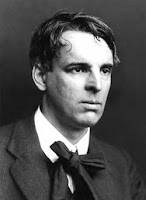'The man who does not read good books has no advantage over the man who cannot read them'
Mark Twain
Mark Twain
Sunday, 13 June 2010
On this day...
Irish poet William Butler Yeats was born in 1865. The son of an artist, Yeats was heavily involved in the creative field from a young age - an environment that also manifested itself in his siblings, who later became keen proponents of the Arts and Crafts movement. Although he attended local schools, Yeats was not an overly academic child, cited as being 'very poor in spelling', and preferred instead to spend time in his father's studio, where he met many of Dublin's leading writers. Yeats' first known works were produced a the age of seventeen, yet, heavily influenced by the likes of Shelley and Edmund Spenser, he found little success in the contemporary Victorian readership. Thus Yeats found his own style, rich in Irish folklore and incorporating instances of mysticism and spiritualism.
Returning to London, he co-founded the 'Rhymers' Club', giving London-based poets the opportunity to recite their works and gain peer appraisal, and Yeats continued his liteary philanthropy by establishing the Irish Literary Theatre for staging Irish and Celtic plays. Yeats became Ireland's first Nobel Prize Winner in 1923 for, 'inspired poetry, which in a highly artistic form gives expression to the spirit of a whole nation', yet he himself considered the award, given soon after Ireland's independence, as 'part of Europe's welcome to the Free State'. However, unusually, Yeats produced some of his best works, 'The Tower' and 'The Winding Stair and Other Poems', after the prize. He died in 1939, at the age of 73.
Subscribe to:
Post Comments (Atom)

No comments:
Post a Comment